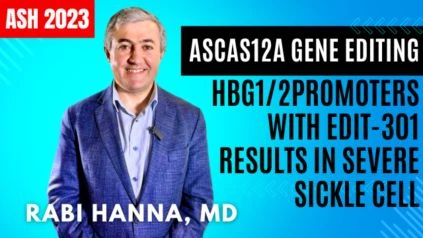Rabi Hanna, MD, from the Department of Pediatric Hematology Oncology and BMT at Cleveland Clinic Children’s, conducted a study on AsCas12a gene editing with EDIT-301 for severe Sickle Cell Disease (SCD) and transfusion-dependent β-thalassemia (TDT). The research aimed to evaluate the efficacy of this approach in achieving normalization of hemoglobin levels and increased production of fetal hemoglobin (HbF) in affected patients.
The results of EDIT-301 in patients with severe SCD and TDT contribute to the growing field of gene-edited therapies for hemoglobinopathies. This novel approach, targeting HBG1/2 promoters, has potential for outcomes in patients with these conditions, advancing our understanding of gene editing’s role in addressing complex hematological disorders and opening avenues for therapeutic interventions.
As gene-edited therapies progress towards wider clinical application, challenges such as scalability, accessibility, and long-term safety need consideration. Opportunities lie in potentially revolutionizing the treatment landscape for hemoglobinopathies, offering solutions for patients.
The data indicating engraftment, normalization of hemoglobin, and increased HbF production after EDIT-301 treatment are significant. These outcomes have the potential to address complications associated with severe SCD and TDT, impacting the health and quality of life for affected patients. The observed improvements in markers of hemolysis represent a step towards mitigating the effects of these conditions.
The safety profile of EDIT-301, consistent with myeloablative conditioning and without serious adverse events, is relevant. As the RUBY and EdiThal trials progress, considerations for long-term safety and durability become paramount. Monitoring strategies should be in place to assess the persistence of therapeutic effects and identify potential late adverse events. This approach ensures the continued safety and efficacy of gene-edited hematopoietic stem cell therapies in the evolving landscape of medical interventions.

